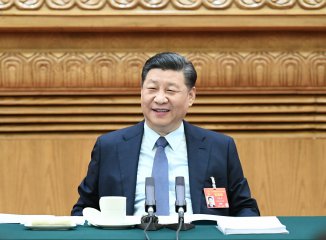HOHHOT/HANGZHOU, Feb. 22 (Xinhua) -- Before the Spring Festival, Xu Zhanxiang visited villagers from Gaomaoquan Village in Hohhot, capital of north China's Inner Mongolia Autonomous Region, with his fellow livestreamers.
Xu is a "rural maker" -- an entrepreneur in the rural area, and he runs a local company that assists aspiring young people with rural entrepreneurship.
Livestreaming e-commerce is one of the company businesses, which helps to boost sales of local agricultural products and bring additional income to local farmers.
Capitalizing on the country's strategy of rural vitalization, Xu's company began to provide voluntary training courses for college students who aspire to be rural makers. Trainees have multiple job choices, such as taking part in livestreaming e-commerce and local factory production.
To spur college students' enthusiasm for becoming rural makers, Xu rushed around college campuses in Inner Mongolia to give speeches to students. Thirteen sessions of social practice have been carried out so far, covering around 300 students.
Caihong, previously trained as a rural maker in Xu's company, who is now working at an agricultural science and technology enterprise in Beijing, intends to develop breeding in his hometown and has been strongly backed by Xu. "For me, it is a worthwhile cause as long as one trainee is willing to contribute to rural vitalization," Xu said.
"We are happy to have young makers here and we really have a good harvest," said Liu Xiuyuan, a local villager.
Thanks to new seed varieties and scientific farming methods brought in by the young makers, the corn yield per hectare of land has risen from around 5.25 tonnes to around 10.5 tonnes now.
"Rural maker economy" is thriving. In Yulingguan Village, Qingliangfeng Township in east China's Zhejiang Province, young maker Hong Liyue set up a culture demonstration base of Asian honeybees, providing local bee owners with voluntary technical assistants and unified purchase services.
As a national nature reserve, Qingliangfeng Township offers a favorable habitat for Asian honeybees. They are easy to raise because they have strong nectar gathering capability and strong adaptability, Hong said, adding that the honey taken from these bees can be sold directly and there is no secondary process.
"Yulingguan is home to many old people. It is good for villagers to raise Asian honeybees and sell honey to fatten their wallets," said Hong.
To attract more rural makers, the township government has established a service center for rural makers in its local exhibition center of agricultural products, offering a free venue for rural makers to develop businesses.
So far, 110 makers in the township have engaged themselves in rural entrepreneurship, fostering multiple industries with local characteristics, such as homestays and vegetable and fruit cultivation.
China has stressed efforts to consolidate its poverty elimination achievements and push for rural vitalization. Xu is delighted to see growing support and recognition on him and to find more young people who are willing to start businesses in rural areas.




















Latest comments